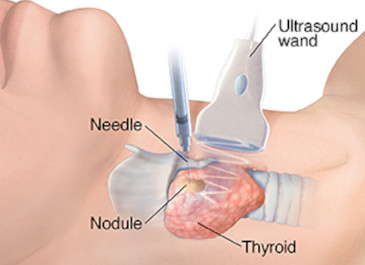Fine Needle Aspiration Biopsy Procedure for Thyroid Gland and Lymph Nodes
The interventional pathologist and team will be conducting a physical examination first before proceeding to performing an ultrasound to understand the nature of the lump/bump. The area is numbed with an anesthetic to minimize any pain and a thin needle is inserted into the area of concern under ultrasound guidance to collect cell samples for immediate evaluation under a microscope. Usually 2-3 samples are required from the lesion in order to provide an accurate diagnosis.
During the procedure, a rapid onsite evaluation (ROSE) for adequacy is performed by the pathologist to determine if the sampled tissue contains adequate material. This is vital in order to prevent the patient from having to return to the office for another procedure. There is nobody better than a pathologist who can truly determine the needed adequacy because ultimately it is the pathologist that will be interpreting the slides to reach a final diagnosis.
The benefit of coming to AR Diagnostics is that the interpreting pathologist is the same person performing the ROSE as well as performing the ultrasound guided FNA (USGFNA)
Length of The Procedure
The entire procedure from start to finish takes approximately 30 minutes.
After the Procedure
- You will rest and be observed for approximately 10-15 min after the procedure and thereafter be allowed to resume your daily activities.
- Although there are no restrictions to daily activities after the procedure, if restrictions are needed, you will be instructed appropriately.
What Next?
- The interventional pathologist will begin working on your case right away.
- The remaining cells will be prepared on slides in a specialized manner different from ROSE for thorough evaluation by the interventional pathologist.
- If needed, additional specialized testing may be required which we will take care of so you don’t have to go anywhere else. These tests include but are not limited to the following:
- Flow cytometry – laser based technique used to detect and analyze chemical and physical characteristics of cells
- Molecular testing – looking for unique molecular alterations to help determine the nature of the mass and help guide treatment protocols
- Immunohistochemistry testing – determine distribution of antigens of interest in healthy and diseased tissues
- Once a thorough evaluation is complete, a report will be prepared with the results and we will notify you and your referring physician.
When Will I Get My Results?
- A preliminary diagnosis will be determined before you leave the clinic.
- A detailed report is usually available in 24-48 hours.
- If specialized testing is needed, the final report will be issues once those tests are completed.
- You don’t have to worry about those tests, we will take care of that for you and update you of the findings.
- Generally, results can be grouped into the following categories
- Clearly benign (not cancer)
- Clearly malignancy (cancer)
- Non-definitive, less clear (usually followed by a surgical biopsy if needed)
How Reliable Is This Test?
In the hand of a skilled interventional pathologist, this test is extremely reliable.
In the case of a clearly benign diagnosis, it may prevent unnecessary surgery.
In the case of a clearly malignant diagnosis, it can expedite the need for surgical management.
In the case of a non-definitive diagnosis, a surgical biopsy may be recommended.
Are there any risks/complications?
A fine needle aspiration is usually associated with little to no significant complications. The most common complications include slight bruising or tenderness of the area for a few days following the procedure. Over the counter pain meds or applying an ice pack can help with such pain.
Although a FNA is an excellent testing modality, it has its limitations. There is a small probability, usually <10% depending on the size, location and type of lump/mass, that it may not be interpreted as cancer even when cancer is there. Rarely, in 1% or fewer cases, it may falsely be interpreted as cancer when cancer is not present. However, most physicians still believe that an FNA procedure is an excellent testing modality.
Call Your Doctors’ Office If Any Of The Following Occurs:
- The swelling doesn’t go away
- There is continued bleeding
- A fever of >100 F
- Pain that does not get better after applying an ice pack or taking pain meds
Anticoagulant Use
- Although a fine needle aspiration is a very minimally invasive procedure, certain situations may require you to be off of your anticoagulation medication for up to a week in advance. Please discuss with your current provider and make sure to let us know if you are on any blood thinners or any other anticoagulation medicines.

Meet the Doctor
Office Hours
Mon – Fri: 9am – 6pm
Sat: 10am to 4pm
Sun: By appointment onlys